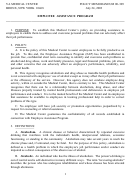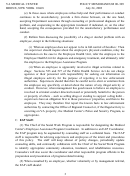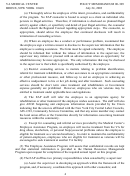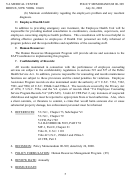Equal Employment Opportunity (Eeo) Policy And Program Administration Form Sample Page 31
ADVERTISEMENT
VA MEDICAL CENTER
POLICY MEMORANDUM 00-304
BRONX, NEW YORK 10468
July 31, 2003
condition for which cosmetic treatments are administered, unless inpatient hospital care
is required or unless complications develop; or an absence because of an employee's
use of an illegal substance, unless the employee is receiving treatment for substance
abuse by a health care provider or by a provider of health care services on referral by a
health care provider. Ordinarily, unless complications arise, the common cold, the flu,
earaches, upset stomach, minor ulcers, headaches (other than migraines), routine dental
or orthodontia problems, and periodontal disease are not serious health conditions.
Allergies, restorative dental or plastic surgery after an injury, removal of cancerous
growth, or mental illness resulting from stress may be serious health conditions only if
such conditions require inpatient care or continuing treatment by a health care
provider.)
IV. RESPONSIBILITIES AND PROCEDURES:
(a) Requesting leave: In order to invoke the entitlement to leave under the
provisions of the FMLA, employees must: 1) submit to their supervisor an Request for
Leave (OPM Form-71) indicating the type of leave that is being requested under the
FMLA; and 2) submit the request not less than thirty (30) days in advance of the need
for leave, unless the need for leave is not foreseeable. If the need was not foreseeable,
the request must be submitted as soon as practicable after the need is known; an
employee may not retroactively invoke FMLA for a previous absence from work; and
3) include with the request acceptable evidence of the need for FMLA leave in the
form of a Certification of Health Care Provider (See Attachment 3) documenting
one of the following: a) the birth of a son or daughter and care of such son or daughter;
b) placement of a child with the employee for adoption or foster care; c) care of a
spouse, son, daughter, or parent of the employee, if such a spouse, son, daughter, or
parent has a serious health condition; d) a serious health condition of the employee that
makes the employee unable to perform the essential functions of his or her position;
and 4) comply with any requirement that a second and/or third opinion of the medical
necessity for the leave be obtained; and 5) make a reasonable effort, subject to the
approval of the employee’s health care provider, to schedule needed FMLA leave on an
intermittent or reduced work schedule basis so as not to disrupt unduly the work of the
Medical Center. (The Certification of Health Care Provider form defines the criteria
for serious health condition, outlines the criteria and procedures for second and third
medical opinions, and describes the evidence that is acceptable for demonstrating the
existence of such a condition.)
(b) Acting on Leave Requests:
i. Supervisors will review each leave request to assure that the employee has
adhered to the above criteria and will: 1) advise the employee of any deficiency in a
request under the FMLA, so the employee has an opportunity to provide the
additional documentation or information; 2) approve requests that meet the criteria
of this policy memorandum and that are for periods of up to thirty calendar days;
and 3) forward to the Associate Director or Chief of Staff, as appropriate, through
the Human Resources Management Program (HRMP), requests for leave without
pay under the FMLA for periods of more than thirty calendar days.
ii. The Associate Director or Chief of Staff will approve requests for leave
without pay for more than thirty calendar days that meet the criteria of the
9
ADVERTISEMENT
0 votes
Related Articles
Related forms
Related Categories
Parent category: Legal
 1
1 2
2 3
3 4
4 5
5 6
6 7
7 8
8 9
9 10
10 11
11 12
12 13
13 14
14 15
15 16
16 17
17 18
18 19
19 20
20 21
21 22
22 23
23 24
24 25
25 26
26 27
27 28
28 29
29 30
30 31
31 32
32 33
33 34
34 35
35 36
36 37
37 38
38 39
39 40
40 41
41 42
42 43
43 44
44 45
45 46
46 47
47 48
48 49
49 50
50 51
51 52
52 53
53 54
54








